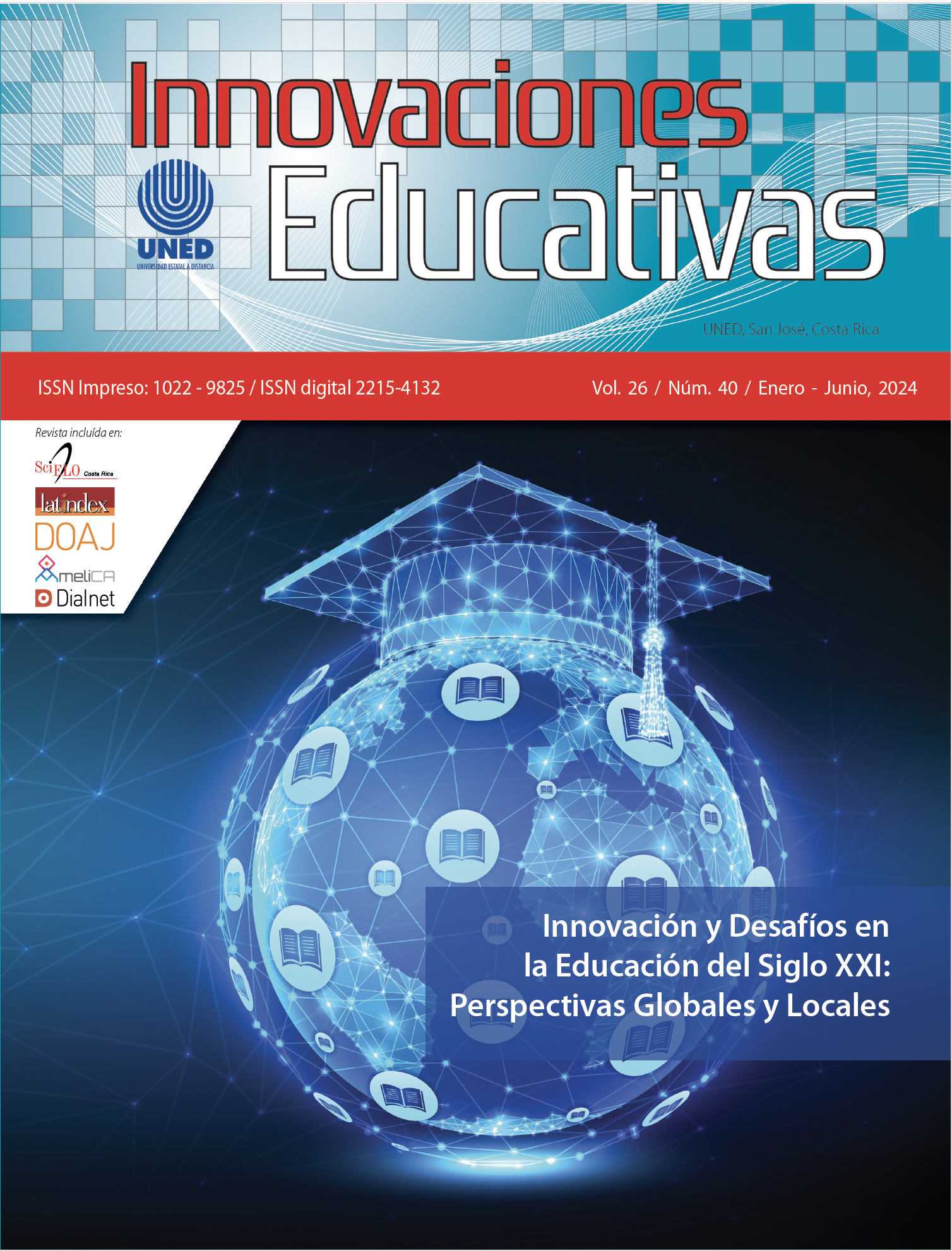Diabolical Sedentarism in Post-Pandemic Education in the Southern Cone of Peru: The Fear of Returning to the Face-to-face
DOI:
https://doi.org/10.22458/ie.v26i40.4870Keywords:
Distance Education, Atypical Student, academic teaching staff, Pandemic, School, PresentialityAbstract
The return to presentiality has raised the alarms of the sedentary lifestyle that was built during the confinement and the tendency to the convenience of not leaving the nest. The manuscript explores the repercussions that the Covid-19 pandemic has had on educational institutions in Southern Peru. After a brief introduction, it addresses the face-to-face fear felt by the main actors in the educational corpus, also addressing the specific development of education in the Andes. As a ramification of the theoretical construct, students long for the winter past shaken by the vibrational waves of the Wuhan bat, because with the return to face-to-face, their comforts in the Internet network and the excuse of being in virtual classes to avoid taking care of certain academic and domestic responsibilities, will no longer be possible. As for the teachers' sphere, the frontal fight against the multiple educational problems in the country, abandoned for two long years, will be resumed. Finally, regarding the parents' stratum, a light of hope to see their children again wearing the sacred school uniform is starting to shine in a tunnel of worry.
References
Barria-Asenjo, N. A., Žižek, S., Scholten, H., Pavón-Cuellar, D., Salas, G., Ariel, O., … Aguilar, S. J. (2022). Returning to the Past to Rethink Socio-Political Antagonisms: Mapping Today’s Situation in Regards to Popular Insurrections. CLCWeb: Comparative Literature and Culture, 24(1), 1–13. https://doi.org/10.7771/1481-4374.4295
Calvo, C., Tagarro, A., Méndez, A., Fernández, B., Albañil, M. R., Bassat, Q., y Mellado, M. J. (2021). COVID-19 pandemic. What have we learned? Anales de Pediatria, 95(5). https://doi.org/10.1016/j.anpedi.2021.09.006
Canaza-Choque, F. A., Huanca-Arohuanca, J. W., Yabar, P. S., Cornejo, G., Mamani, D., Pérez, K., y Cavero, H. N. (2022). Escuela-Montaña: desmontar el poder desde la altura. Revista de Investigaciones Altoandinas, 24(2), 139–148. https://doi.org/10.18271/ria.2022.401
Cerna, L. P., Acosta, M., y Valenzuela, M. R. (2022). Experiencia en educación sanitaria por WhatsApp en una población desfavorecida de Pampas - Perú. Atención Primaria, 54(6). https://doi.org/10.1016/j.aprim.2022.102347
Congreso de la República de Perú. (2012). Ley de Reforma Magisterial. LEY N.° 29944. Reglamento de la Ley de Reforma Magisterial D.S. N.° 004-2013-ED y modificatorias. Gobierno del Perú. https://www.gob.pe/institucion/congreso-de-la-republica/normas-legales/118463-29944
Congreso de la República de Perú. (2022). Código de los Niños y Adolescentes. Ley No 27337. Gobierno del Perú. https://www.gob.pe/institucion/congreso-de-la-republica/normas-legales/3366849-27337
De Sousa, B. (2018). Constitución y hegemonía. Luchas contra la dominación global. Chasqui. Revista Latinoamericana de Comunicación, (136), 13–31. https://dialnet.unirioja.es/servlet/articulo?codigo=6242339
Del Moral, A. J. (2007). El derecho a opinar de niños, niñas y adolescentes en la Convención sobre los Derechos del Niño. Cuestiones Jurídicas, 1(2), 73–99. https://www.redalyc.org/pdf/1275/127519340005.pdf
Escobar-Mamani, F., y Gómez-Arteta, I. (2020). WhatsApp para el desarrollo de habilidades comunicativas orales y escritas en adolescentes peruanos. Comunicar, 28(65), 111–120. https://doi.org/10.3916/C65-2020-10
Fernández, G. (2005). Kharisiris y violencia ritual: agosto en el altiplano aymara. Revista Textos Antropológicos, 15(1), 181–196. http://www.revistasbolivianas.org.bo/scielo.php?script=sci_abstract&pid=&lng=es&nrm=iso&tlng=
Fernández, G. (2006). Kharisiris de agosto en el Altiplano Aymara de Bolivia. Chungara, Revista de Antropología Chilena, 38(1), 51–62. https://scielo.conicyt.cl/pdf/chungara/v38n1/art06.pdf
Font, P. (2018). La facticidad de la filosofía política de Francisco Suárez: un camino hacia otra modernidad. Pensamiento, 74(279), 179–200. https://doi.org/pen.v74.i279.y2018.009
Garcés, M., Miño-Puigcercós, R., Neut, P., y Passerón, E. (2022). Reconstruir un mundo en el que valga la pena vivir: experiencias para la emancipación y la transformación desde la escuela. Revista Izquierdas, (51), 1–12. https://dialnet.unirioja.es/servlet/articulo?codigo=8361343
Huanca-Arohuanca, J. W. (2020). Caleidoscopio social al Covid-19: pánico y desesperación en tiempos de aislamiento. Revista Universidad y Sociedad, 12(6), 226–231. https://rus.ucf.edu.cu/index.php/rus/article/view/1836
Huanca-Arohuanca, J. W. (2022a). Combate cuerpo a cuerpo para entrar a la Liga de los Dioses: Scopus y Web of Science como fin supremo. Revista Venezolana de Gerencia, 27, 663–679. https://doi.org/10.52080/rvgluz.27.7.43
Huanca-Arohuanca, J. W. (2022b). El estado de la cuestión sobre la participación política en los jóvenes de la Nación Aymara - Perú. Un diálogo teórico desde sus actores. Apuntes Universitarios, 12(1), 16–52. https://doi.org/10.17162/au.v11i5.914
Huanca-Arohuanca, J. W. (2022c). El odio al indio: la primitiva venganza de una clase histórica moralmente decadente y la segunda evangelización a sangre y fuego en el Estado Plurinacional de Bolivia. Estudios Del Desarrollo Social: Cuba y América Latina, 10(2), 225–242. Retrieved from http://www.revflacso.uh.cu/index.php/EDS/article/view/726
Huanca-Arohuanca, J. W. (2022d). Otros Dioses también respiran: Amuyawi (pensar) desde la Muchedad y el método imprecativo-contrapoder frente a la epistemología universal. Revista de Filosofía, 39(2), 67–90. https://doi.org/10.5281/zenodo.7297119
Huanca-Arohuanca, J. W. (2023). Dioses terrenales contra Dios: El nacimiento del Amuyawi (pensar) de Frontera para la América de Colores y el paralelismo con Slavoj Žižek. Revista Izquierdas, (52), 1–26. http://www.izquierdas.cl/images/pdf/2023/52/art14.pdf
Lozano-Vicente, A. (2016). Los derechos del niño: cuestiones sobre su fundamentación. Revista Latinoamericana de Ciencias Sociales, Niñez y Juventud, 14(1), 67–79. https://doi.org/10.11600/1692715x.1413290515
Luri, G. (2022). What Remains in Education. Teoría de La Educación. Revista Interuniversitaria, 34(2), 177–188. https://doi.org/10.14201/teri.27573
Ministerio de Educación de Perú. (2017). Currículo Nacional de Educación Básica. Gobierno del Perú. Recuperado el 12 de diciembre de 2023 de http://www.minedu.gob.pe/curriculo/documentos.php#top
Ministerio de Justicia y Derechos Humanos de Perú. (2019). Constitución Política del Perú (15ª ed.). Gobierno del Perú. https://www.gob.pe/institucion/minjus/informes-publicaciones/3131838-decimo-quinta-edicion-oficial-de-la-constitucion-politica-del-peru
Moreira, J. S., y Zambrano, M. V. (2022). Educación virtual: un análisis en tiempos de pandemia. Revista RELEP, 4(1), 32–45. https://doi.org/10.46990/relep.2022.4.1.549
Picornell-Lucas, A. (2019). La realidad de los derechos de los niños y de las niñas en un mundo en transformación. A 30 años de la Convención. Revista Direito Práxis, 10(2), 1176–1191. https://doi.org/10.1590/2179-8966/2019/40095
Quijano, A. (2014). Colonialidad del poder, eurocentrismo y América Latina. CLACSO.
UNICEF. (2006). Convención sobre los derechos del niño. Nuevo Siglo.
Vidal, M. J., Gari, M., Fernández, B., y Vialart, M. N. (2022). WhatsApp como plataforma de enseñanza-aprendizaje durante la pandemia de COVID-19. Educación Médica Superior, 36(1), 1–18. http://scielo.sld.cu/scielo.php?script=sci_arttext&pid=S0864-21412022000100020
Downloads
Published
How to Cite
Issue
Section
License
Copyright (c) 2023 Innovaciones Educativas

This work is licensed under a Creative Commons Attribution-NonCommercial-NoDerivatives 4.0 International License.

